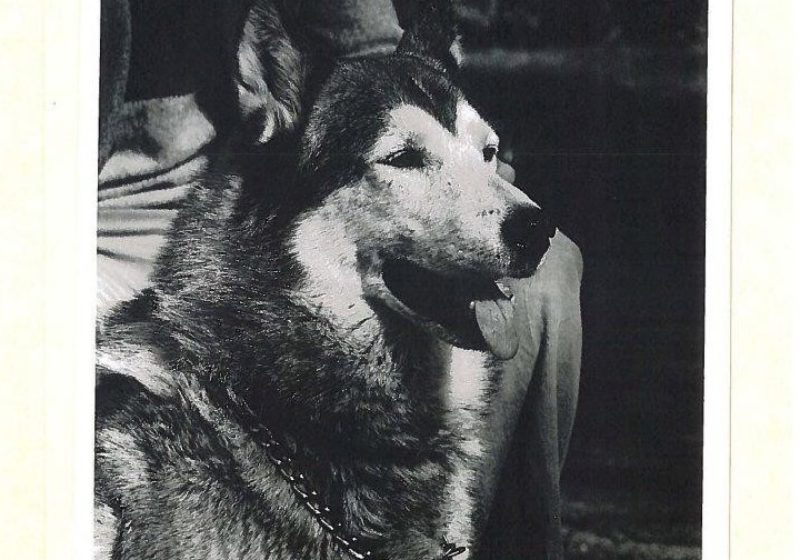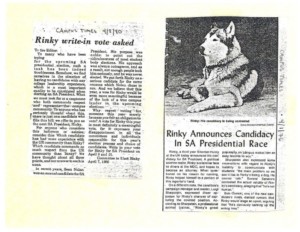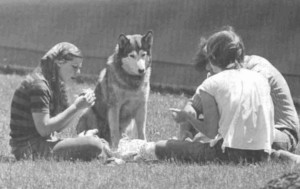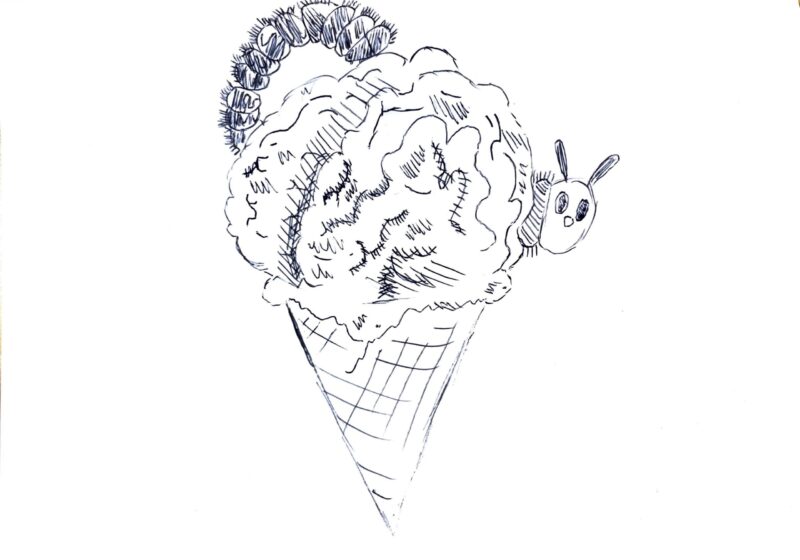Long before Quad Fox earned Democrat & Chronicle coverage and a write-in campaign for SA president, Rinky was here, barking up the same tree.
A Siberian husky who prowled campus in the ‘70s and ‘80s, Rinky earned around 15 percent of the vote in multiple SA presidential elections, according to his 1981 D&C feature.
Yet, the dog’s fame never got in the way of what made him such an icon in the first place: an unshakable, reassuring presence.
Beyond his intellect, good looks, and laid-back personality, Rinky was “very good with kids,” owner Roger Weissberg said in that feature. “I’ve seen people talk to him for hours.”
“Students can express things to dogs they can’t express to others,” Weissberg added. “Dogs are very accepting, loving, and responsive […] Students often find a campus lonely and threatening. Rinky’s presence is very comforting.”
The husky would often wander around campus and even attend courses, a practice that began when Weissberg attended Brandeis as an undergrad. Rinky accompanied his owner to economics class, until Weissberg dropped it after three weeks. But, as Weissberg recalled, “Rinky kept showing up for it until the end of the semester.”
In the feature, students and faculty described how Rinky fostered a sense of community.
“The dog becomes everybody’s shared pet,” psychology professor Ladd Wheeler said. “I suspect that for a lot of kids, Rinky also becomes a symbol of the childhood they left behind when they left home for college.”
“When you worry about classes and exams and you’re rushing around like crazy, there’s Rinky generating warmth,” grad student Vincent Fioramenti said. “How can you ignore that? How can you not go over and pet him?”
The feature described how Weissberg found Rinky, then called “Scout,” at an animal hospital in 1970 as a sophomore at Brandeis.
“His owner had abused and starved him, then left him,” Weissberg said. “This pup had rickets and looked scrawny and awful.”
This was Rinky’s ninth day in the hospital. One more and he would be put down.
“I started to walk away, and he started to yelp and cry,” recalled Weissberg, who went from grad student to assistant professor at UR. “I turned around and said, ‘All right, Rinky, I’ll take you.’”
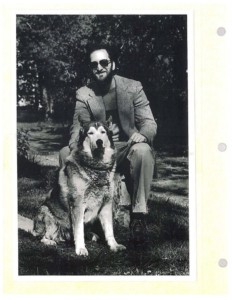
Roger Weissberg, Rinky’s owner, allowed him to roam on campus, interacting with students and taking classes.
In 1974, the duo hit Rochester, where the husky became a larger-than-life presence on campus — including in the classroom.
“Rinky’s welcome everywhere,” said undergrad Jim Swan, who befriended the dog during Political Science 101.
Grad student Pat Sheehan, meanwhile, likened Rinky to “an institution.”
In 1976, a Campus Times humor article announced Rinky’s candidacy for student president. The husky’s campaign manager said he was an “easy favorite” due to his popularity, but worried about his communication skills impacting the vote.
“The main problem as we see it lies with Rinky being a dog,” his manager said. “He cannot talk.”
Rinky wasn’t the first canine SA candidate, either. On Facebook, archivist Melissa Mead told of Krypto, who finished sixth in the 1971 election.
Despite his own 1976 defeat, Rinky’s presidential support never waned. A 1980 letter to the CT preferred him to what it called an underqualified slate of human candidates:
“For anyone who considers this ludicrous or asinine, consider this: Which candidate has had more experience with the UR community than Rinky? Which candidate commands as much respect?”
CT recently spoke to Weissberg, who now specializes in social and emotional learning at the University of Illinois at Chicago.
He said Rinky died in 1985 at the age of 15 after the pair had moved to Yale. When Weissberg looks back on Rinky, he remembers the last dog he’s owned.
“Rinky was a one-man dog, and I was a one-dog man,” Weissberg said.
Though, he had no part in the dog’s “independent campaigns.”
Rinky’s celebrity wasn’t limited to UR, either. At Brandeis, his owner recalled how the school demanded Rinky be moved off campus. Weissberg brought the matter to the student judiciary committee in what he termed “Brandeis vs. Rinky.”
The pair won the decision — thanks to everyone in Weissberg’s dorm signing in support. Years later at Yale, Weissberg’s wife spoke to a Brandeis grad who didn’t know Weissberg.
“But they knew Rinky,” he recalled.
It was the same way at UR, and Weissberg didn’t have a hard time seeing why, because Rinky “constantly did things that amazed people.”
For instance, Weissberg said that Rinky could tell time. At his Brandeis graduation, Weissberg, Rinky, and his parents each went their separate ways, agreeing to reconvene at three. Weissberg’s parents had been skeptical of Rinky’s temporal abilities.
But, while Weissberg was late, “Rinky came walking up at three o’clock,” he recounted.
Weissberg described Rinky as a perfect fit for college campuses.
“He hated to be locked up,” the owner said. “Maybe that was from his experience in the animal hospital.”
Rinky often sat outside the psychology building where students would pet him. Additionally, Weissberg said Rinky’s oft-unsupervised “auditing” of courses was unobtrusive and caused only one incident over a decade-plus span.
According to Weissberg, that incident was initially the fault of another class dog: a beagle who got a bit too friendly around Rinky. After the lecturer realized Rinky wasn’t to blame and let him return, the husky outstayed his welcome by letting drops fly on the stage.
Still, as long as the approach is structured, Weissberg said, he believes the campus could still benefit from long-term canine brethren. The psychology professor agreed with Wheeler that campus pets provide nostalgic comfort.
“A lot of [students] miss their pets,” Weissberg said. “Having dogs on campus can help with the adjustment.”
He added, “But they have to be special kinds of dogs.”
